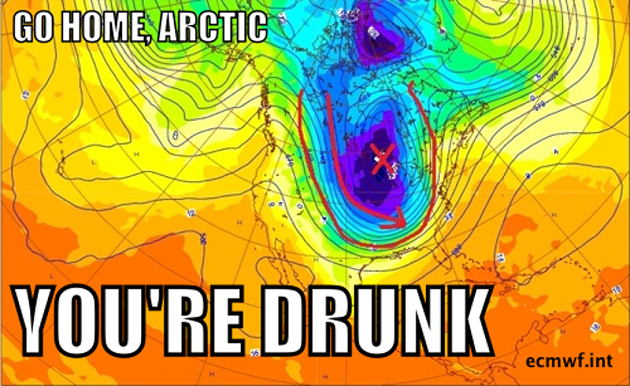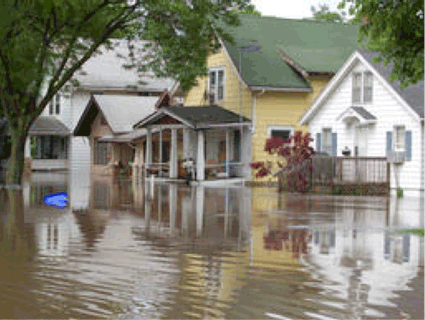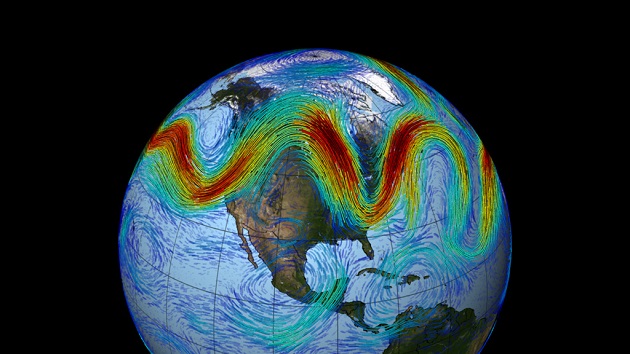
The jet stream in a particularly wavy state<a href="http://www.jpl.nasa.gov/images/cassini/20120313/Earth_jet_stream-full.jpg">NASA</A>/GSFC
Just when weather weary Americans thought they’d found a reprieve, the latest forecasts suggest that the polar vortex will, again, descend into the heart of the country next week, bringing with it staggering cold. If so, it will be just the latest weather extreme in a winter that has seen so many of them. California has been extremely dry, while the flood-soaked UK has been extremely wet. Alaska has been extremely hot (as has Sochi), while the snow-pummeled US East Coast has been extremely cold. They’re all different, and yet on a deeper level, perhaps, they’re all the same.
This weather now serves as the backdrop—and perhaps, as the inspiration—for an increasingly epic debate within the field of climate research. You see, one climate researcher, Jennifer Francis of Rutgers University, has advanced an influential theory suggesting that winters like this one may be growing more likely to occur. The hypothesis is that by rapidly melting the Arctic, global warming is slowing down the fast-moving river of air far above us known as the jet stream—in turn causing weather patterns to get stuck in place for longer, and leading to more extremes of the sort that we’ve all been experiencing. “There is a lot of pretty tantalizing evidence that our hypothesis seems to be bearing some fruit,” Francis explained on the latest installment of the Inquiring Minds podcast. The current winter is a “perfect example” of the kind of jet stream pattern that her research predicts, Francis added (although she emphasized that no one atmospheric event can be directly blamed on climate change).
Francis’s idea has gained rapid celebrity, no doubt because it seems to make sense of our mind-boggling weather. After all, it isn’t often that an idea first published less than two years is strongly embraced by the president’s science adviser in a widely watched YouTube video. And yet in a letter to the journal Science last week, five leading climate scientists—mainstream researchers who accept a number of other ideas about how global warming is changing the weather, from worsening heat waves to driving heavier rainfall—strongly contested Francis’s jet stream claim, calling it “interesting” but contending that “alternative observational analyses and simulations have not confirmed the hypothesis.” One of the authors was the highly influential climate researcher Kevin Trenberth of the National Center for Atmospheric Research, who also appeared on Inquiring Minds this week alongside Francis to debate the matter.
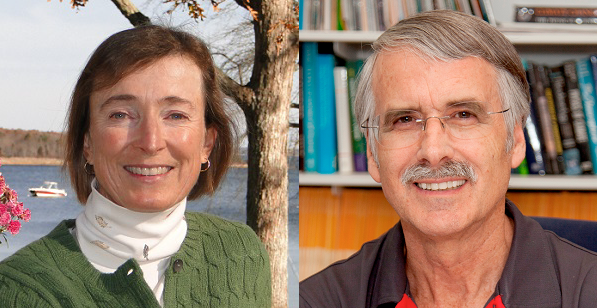
“I applaud Jennifer for raising the issue,” Trenberth said on the show, but he argued that much more research is needed, adding that “I’m suspicious that the outcome will not be quite the way in which Jennifer would like.” Trenberth just doesn’t buy the seemingly counterintuitive idea of global warming making winters seem worse, although he is more than willing to cite other recent events, such as dramatic heat in Australia, Alaska, and Brazil, as the kind of extreme weather that climate change should produce. “At least with regard to global warming, it’s on the right side of things,” said Trenberth of these heat waves. “It’s much harder to see how cold can be caused by global warming.”
What’s going on here? In climate science, too many of the “debates” that we hear about are fake, trumped up affairs generated by climate skeptics who aim to sow doubt. But that’s not the case here: The argument over Francis’s work is real, legitimate, and damn interesting to boot. There is, quite simply, a massive amount at stake. The weather touches all of us personally and immediately. Indeed, social scientists have shown that our recent weather experience is a powerful determinant of whether we believe in global warming in the first place. If Francis is right, the very way that we experience global warming will be vastly different than scientists had, until now, foreseen—and perhaps will stay that way for our entire lives.
What Happens in the Arctic…
To understand Jennifer Francis’ big idea, you first have to understand what’s happening with the Arctic. It’s the part of the climate system that Francis has spent her career studying, and it’s the part that has changed the most, and the most rapidly, over the past decade. The rate of warming in the Arctic has been twice that of the mid-latitudes, and that warming has been punctuated by some truly shocking moments, such as the year 2007 and its unprecedented sea ice decline (since surpassed by the year 2012). 2007 “literally smashed the all-time record low for the summer minimum extent,” says Francis. And as she watched it happen, she knew that “the system as we knew it had fundamentally changed.”
What happened next is that Francis in effect crossed the streams: She combined together her expertise on the Arctic with some new thinking about the dynamics of the atmosphere. “Those momentous changes that we started to see happening got me thinking, and this kind of got me going back to my roots in meteorology,” Francis says. “And I realized that this rapid warming happening up there, and the ice loss we were witnessing, must have an effect on the large-scale circulation system, or the atmospheric patterns, beyond the Arctic.”
The result was a now famous 2012 paper titled, “Evidence linking Arctic amplification to extreme weather in mid-latitudes,” coauthored with Stephen Vavrus of the University of Wisconsin-Madison. In it, the two researchers presented evidence that the Arctic’s rapid warming, which they termed “Arctic amplification,” was having a major atmospheric effect by reducing something called the “poleward thickness gradient.” That sounds pretty wonky, but it simply refers to the difference in the atmosphere’s thickness as one progresses from south to north. We all know that hot air rises, and thus, the atmosphere is thicker nearer to the equator than it is at the poles. But with a rapidly warming Arctic, the thickness difference between south and north should decline, because the Arctic atmosphere would increase in thickness more rapidly than the atmosphere to the south. And that, in turn, changes the jet stream, whose motion is driven by these thickness differences.
You can watch Francis give a more thorough scientific explanation of the idea here, complete with an impressive video animation of the jet stream:
“We know that as the Arctic warms much faster, it will weaken this temperature difference between the north and the south,” Francis explains. “And because that temperature difference is one of the drivers of the west to east winds of the jet stream, we expect to see the west to east winds get weaker, as that temperature difference gets smaller. And we know that when the jet stream gets weaker, it is more easily deflected.”
That, in turn, leads to extreme weather—or so the theory goes. As Francis and Vavrus put it in their 2012 paper, a slowing down of the jet stream “causes more persistent weather conditions that can increase the likelihood of certain types of extreme weather, such as drought, prolonged precipitation, cold spells, and heat waves.” That sounds an awful lot like a recipe for what we’ve recently seen in California, the UK, the East Coast, and Alaska/Sochi. So no wonder this idea has gotten so much attention lately. The jet stream this winter, says Francis, has been “pretty much locked in place since December, until very recently.”
The Case for Skepticism
Francis’s idea is surprisingly simple, once you get down to it, so much so that as the polar vortex descended upon the United States in early January, pop culture references abounded. One particularly popular internet meme declared, “Go home, Arctic, you’re drunk,” a line that even made its way onto to NPR’s popular program Wait, Wait Don’t Tell Me. The meme isn’t just funny: It captures the basic idea that weather is staggering around in a way that it doesn’t normally do, a bit out of its wits of late due to the jet stream.
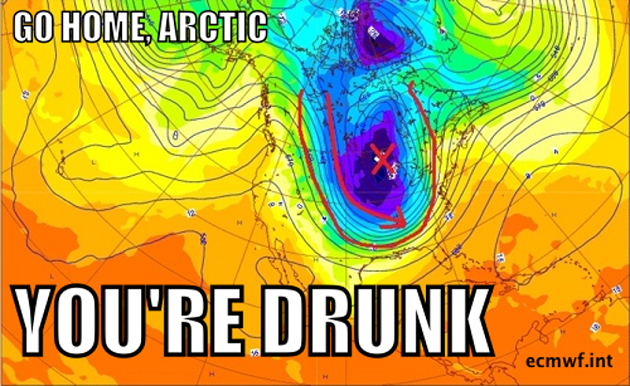
No wonder, then, that Francis’ ideas have gotten so much media attention. At a time when all of us are searching for some explanation for mind-boggling winter weather, along comes a scientist who seems to explain it all to us clearly, and also to link it to climate change.
So why don’t scientists like Kevin Trenberth accept it?
On Inquiring Minds, Trenberth outlined a number of scientific criticisms. One of them is simply that there is a great deal of change in the jet stream anyway, and more wavy patterns just happen from time to time. “The main counterargument to Jennifer at the moment is that a lot of this can simply happen through natural variability,” Trenberth explained. As he noted, there have been winters in the past with wavy jet streams and very cold mid-latitude “polar vortex” excursions. “In some years, the Arctic air gets bottled up, and it doesn’t penetrate into middle latitudes much,” says Trenberth, “and in other years, it has more waviness, outbreaks of cold occur.”
And there’s an additional reason for skepticism. Trenberth thinks that if a process as important as the one described by Francis were occurring, then climate models—complex computer simulations of the atmosphere under climate change—would have picked it up. But when scientists run these models, he says, “it takes a really long time, 50 years or something like that, to see a big change in the atmospheric circulation in association with climate change.” Francis is thus postulating a change much more rapid than what the models show.
In response to such criticisms, Francis fully admits that her idea is new, not fully accepted by all scientists, and requires further testing. One problem, she notes, is that the Arctic change has been so fast that there aren’t many years of jet stream behavior that you can even study to prove or disprove her ideas. “The rapidly warming Arctic has really only been a detectable signal in the system really in the last decade, maybe decade and a half,” she says. “And so literally we only have maybe 15 years where we might be able to detect any response of the atmosphere to this rapidly warming Arctic.”
That’s How Science Works
Stepping back and surveying this exchange, what one sees is a model of how science works when it is working well, in the way that it is supposed to. It’s the utter opposite of politicized “debates” in which skeptics go to the media to raise issues that are red herrings or already resolved by researchers, and most scientists don’t even bother to respond.
By contrast, here we have a scientist (Francis) who has reason to believe she’s uncovered something new and unexpected in the climate system, who publishes that idea, and who cites a combination of physical reasoning and (admittedly limited) observations. But other scientists (like Trenberth) are, as yet, unconvinced that the new idea meets the burden placed upon ideas of its kind when they are first introduced. Nor are they able to fit the argument easily into the context of what they already know, as encoded in the climate models whose equations represent our state-of-the-art physical understanding of the climate system.
So what happens now? Well, every year is more data, which means that every year is an additional scientific test for Francis. Scientists simply have to watch the Arctic, and the atmosphere, and see how they match what Francis has postulated. And given the amount of attention the idea has received, there are a lot of them out there now, paying very close attention.
“I think in the next few years, we’re going to get a lot of answers,” says Francis. If you live in the Northern Hemisphere, you may not have to wait for scientists to publish those answers: You’ll probably feel them first.
To listen to the full Inquiring Minds debate between Jennifer Francis and Kevin Trenberth, you can stream here:
This episode of Inquiring Minds, a podcast hosted by neuroscientist and musician Indre Viskontas and best-selling author Chris Mooney, also features a discussion about Indre’s new 24-lecture course, “12 Essential Scientific Concepts,” which was just released by The Teaching Company as part of the “Great Courses” series.
To catch future shows right when they are released, subscribe to Inquiring Minds via iTunes or RSS. We are also available on Stitcher and on Swell. You can follow the show on Twitter at @inquiringshow and like us on Facebook. Inquiring Minds was also recently singled out as one of the “Best of 2013” on iTunes—you can learn more here.
